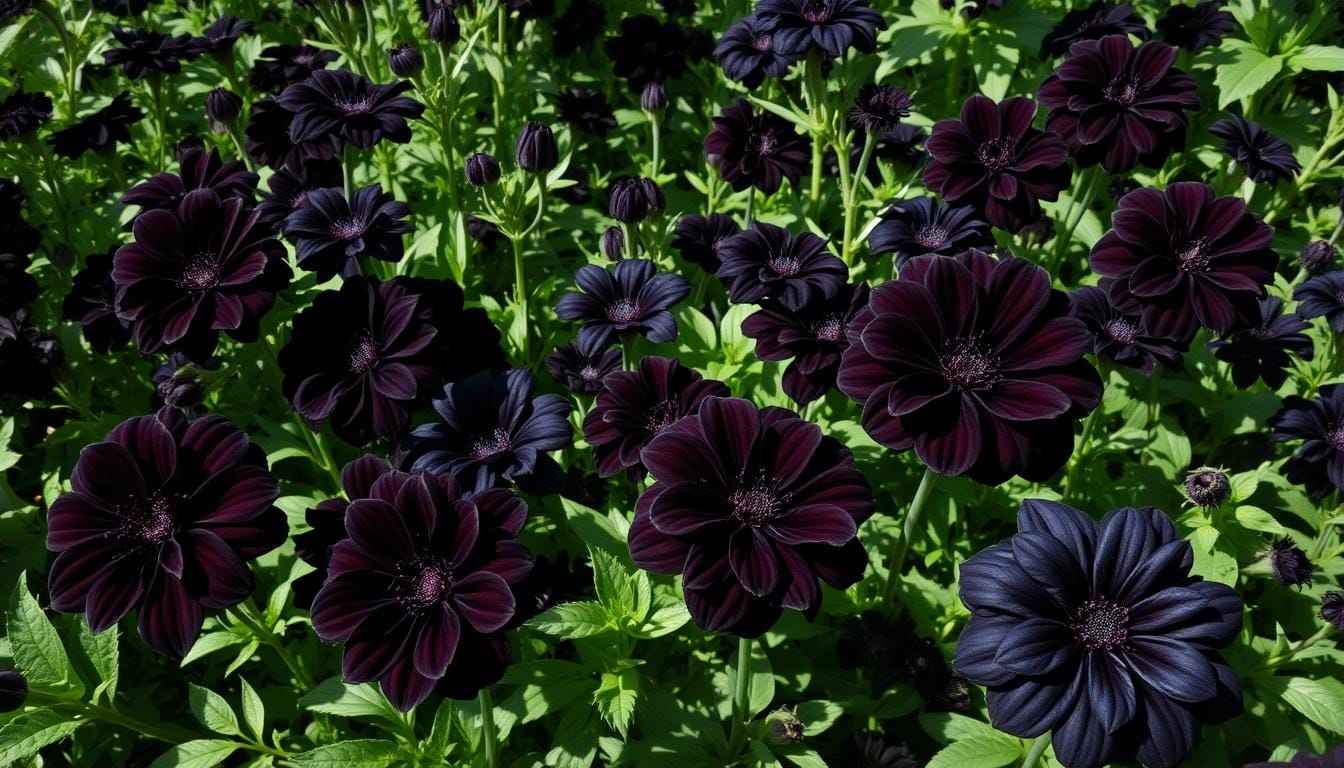Dark and Mysterious Black Flowers for Your Garden
In the world of gardening, black flowers are becoming more popular. These flowers, with their dark petals, add a unique touch to gardens. They stand out against green leaves and add drama to any space.
These flowers are not just beautiful; they also have a special charm. They bring a sense of mystery and elegance to gardens. This makes them a favorite among gardeners who want something different.
Key Takeaways
- Discover the allure and symbolism of black flowers in garden design
- Explore the historical significance and modern appeal of ebony petals
- Learn about popular varieties of black flowers and how to incorporate them into your garden
- Understand the growing conditions and care required for dark dahlias, roses, and other noir varieties
- Discover ways to create a captivating Gothic-inspired garden with black flowers
Understanding the Allure of Black Flowers
Black flowers have always been fascinating. They go back to the Victorian era’s gothic florals and today’s somber bouquets. Artists, writers, and gardeners love them for their mystery and charm.
The Symbolism Behind Dark Blooms
In many cultures, black flowers symbolize death, mourning, and the occult. Their dark colors bring a sense of sadness and mystery. They stand for change, new beginnings, and life’s cycle. Used in funerary rituals or to show life’s darker sides, they hold deep meaning.
Historical Significance of Ebony Petals
Black flowers have a long history, dating back to ancient times. They were used in religious rituals and royal gardens. In the Middle Ages, they were linked to witchcraft, sparking both wonder and fear.
During the Victorian era, they symbolized mourning. They were often seen in funeral arrangements and bouquets.
Modern Appeal in Garden Design
Today, black flowers still enchant gardeners and landscapers. They add a striking contrast to gardens, making them stand out. With ebony dahlias and inky-petaled roses, they bring drama and elegance to any outdoor space.
“Black flowers are the embodiment of the unknown, the mysterious, and the captivating. They whisper of secrets and shadows, inviting us to explore the darker corners of the natural world.”
Popular Varieties of Black Flowers
Gardeners looking to add mystery and drama can choose from many black flower varieties. The black dahlia and black rose are among the most sought-after. These flowers bring a unique beauty that can make any garden stand out.
The black dahlia is a favorite for its deep, almost black petals. These flowers have vibrant centers that contrast beautifully. They come in various shapes and sizes, perfect for borders, cut flower arrangements, and containers.
The black rose is another iconic choice. These rare flowers have petals that range from deep burgundy to true black. They are not just beautiful but also carry deep symbolic meanings, like passion and mystery.
For something different, consider the black lily and black calla lily. The black lily has velvety, iridescent petals that are mesmerizing. The black calla lily adds elegance with its funnel-shaped blooms, perfect for gardens or arrangements.
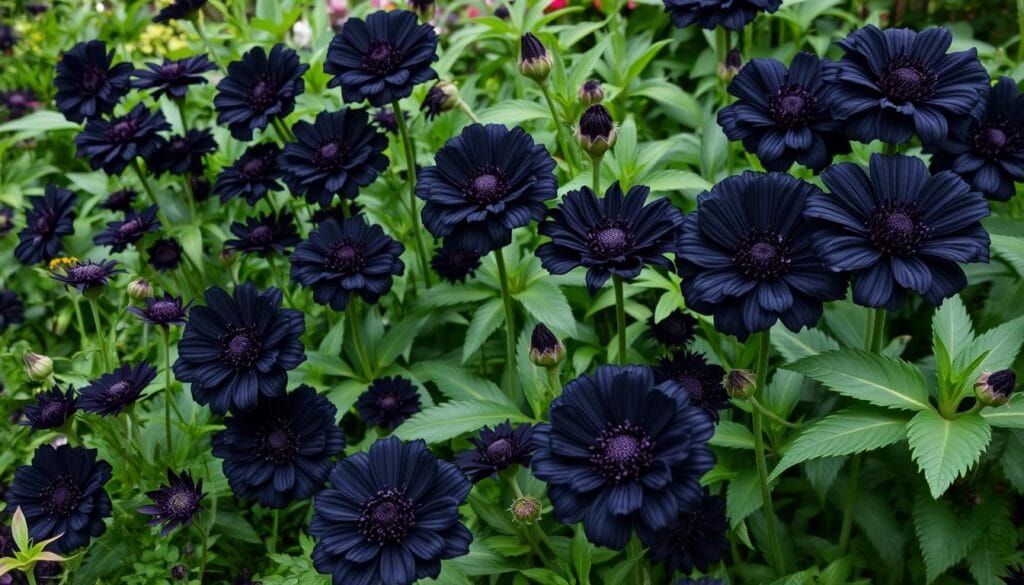
Black flowers can be a stunning addition to any garden or home. Whether you use them in your landscape or in floral designs, they are unforgettable. Learn about their unique features and care to find the perfect black flower for your space.
Growing Tips for Black Dahlias and Roses
To grow stunning black dahlias and roses, focus on soil and growing conditions. Follow expert advice to make sure these dark blooms flourish in your garden.
Soil Requirements and Preparation
Black dahlias and roses love well-draining, rich soil with a pH of 6.0 to 6.5. Add compost or peat moss to the soil to help it drain better and feed the plants. Make sure the area gets lots of sunlight, as these black flowers need at least 6 hours of direct sun daily.
Optimal Growing Conditions
- Water regularly, keeping the soil moist but not too wet.
- Use a balanced, slow-release fertilizer during the growing season. This helps them grow strong and bloom well.
- Prune and deadhead spent flowers to keep them blooming.
- Support tall varieties with stakes or trellises to prevent them from falling over.
Common Pests and Diseases
Black dahlias and roses might face pests like aphids, spider mites, and powdery mildew. Watch your plants closely and treat any problems quickly. Use organic solutions like insecticidal soap or neem oil to keep your black flowers healthy and beautiful.
Knowing what your black flowers need for soil, light, and care will help you create a stunning Gothic garden. It will be a low-maintenance space that showcases these mysterious blooms.
Creating Gothic Garden Spaces
Using gothic florals and ebony petals can turn your garden into a magical place. Think about the garden’s layout to make it feel mysterious and moody.
Begin with tall plants like black hollyhocks and dark sunflowers for grandeur. Add medium-height plants like black baccara roses and black velvet nasturtium for interest. Use low-growing plants like Red Rubin Basil to add color and ground the design.
Plan your garden’s layout carefully. Use winding paths, gates, and ornamental fences to add mystery. Add dark hardscape elements like ebony benches or black pebbles for a cohesive look.
Balance the dark gothic florals and ebony petals with lighter touches. Include white flowers, silver leaves, or pale stones for contrast and to avoid feeling too dark.
“A gothic garden is a sanctuary, a place for healing and contemplation. The dark blooms and moody ambiance evoke a sense of wonderment and solace.”
Designing a gothic garden thoughtfully lets you create a unique outdoor space. It shows off your love for gothic florals and ebony petals.
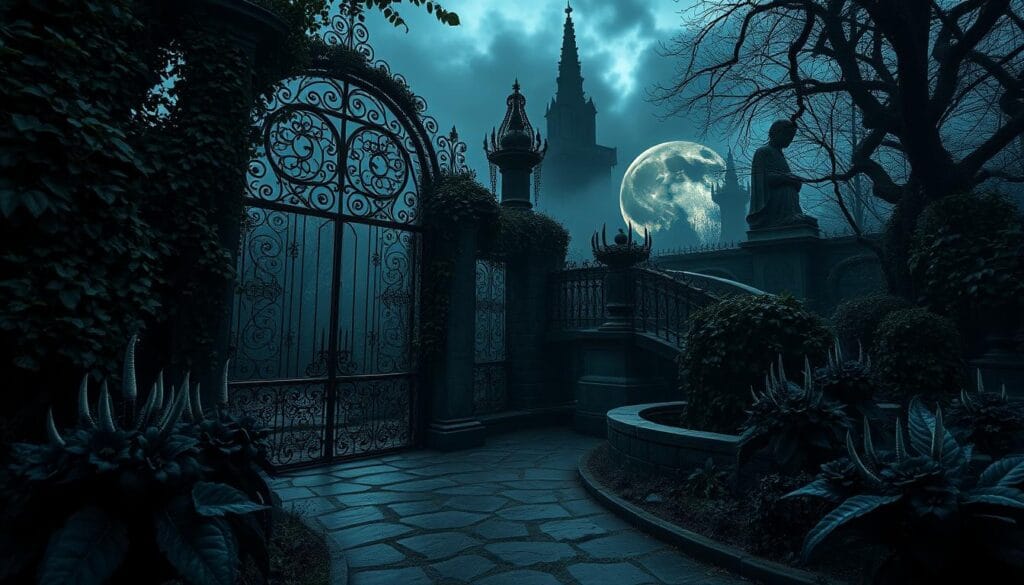
Seasonal Guide to Black Flowers
Exploring the world of black flowers brings mystery and depth to your garden all year. Each season offers a dark bloom that adds its own unique touch.
Spring Dark Blooms
Spring brings life to your garden with black flowers that stand out against greenery. Try planting ebony tulips, somber hellebores, and black bat flowers in early spring. They create a moody display.
Summer Noir Varieties
Summer’s heat brings bold black flowers that grab your attention. Black dahlias, deep purple-black roses, and black Calla lilies make a stunning summer garden.
Fall and Winter Options
Fall and winter bring a somber beauty to your garden. Black cosmos and inky-hued lilies contrast with changing leaves. Winter-hardy Lenten roses and black pansies add mystery in cold months.
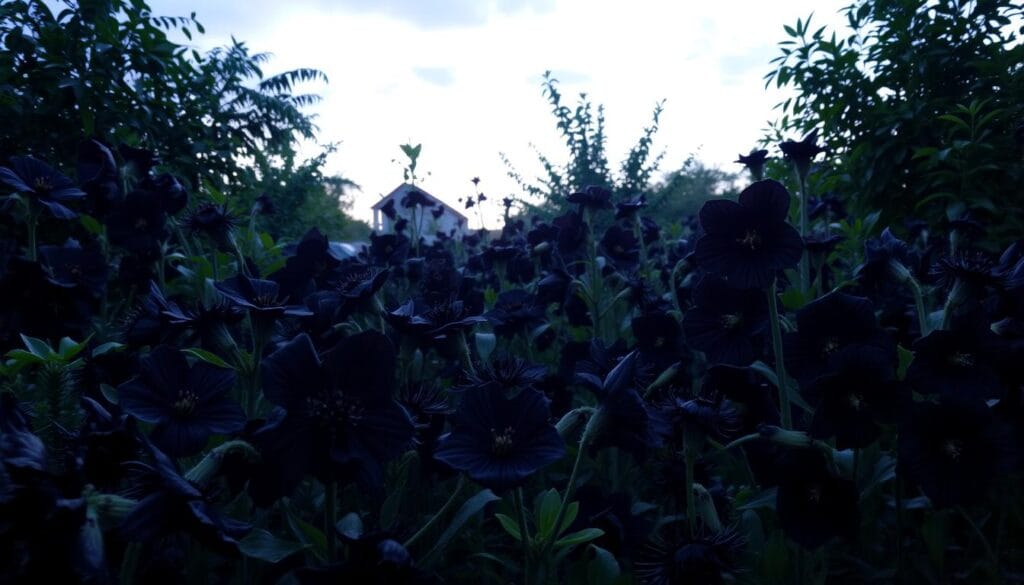
Choosing black flowers for each season creates a captivating garden. It enchants the eye and sparks the imagination all year.
Caring for Black Calla Lilies and Irises
Cultivating the captivating black calla lily and enchanting black flowers of irises requires special attention. These dark beauties demand specific care to thrive in your garden.
Planting and Soil Needs
For black calla lilies, choose a well-draining, humus-rich soil. Plant the rhizomes 4-6 inches deep, spacing them 12-18 inches apart. Irises prefer slightly acidic, nutrient-dense soil. Plant them with the rhizome just below the surface, 12-18 inches apart.
Watering and Sunlight
- Keep black calla lily soil consistently moist, but avoid overwatering.
- Irises require regular watering, especially during the growing season, but allow the soil to slightly dry out between waterings.
- Both plants thrive in full sun, with at least 6 hours of direct sunlight per day.
Overwintering Techniques
For black calla lilies, dig up the rhizomes after the first frost. Store them in a cool, dry place over winter. In early spring, replant the rhizomes. Irises can remain in the ground year-round, but mulch heavily in the fall to protect the roots.
| Care Requirement | Black Calla Lily | Black Iris |
|---|---|---|
| Soil | Well-draining, humus-rich | Slightly acidic, nutrient-dense |
| Planting Depth | 4-6 inches | Just below surface |
| Spacing | 12-18 inches | 12-18 inches |
| Watering | Consistently moist | Regular, allowing soil to dry slightly |
| Sunlight | Full sun | Full sun |
| Overwintering | Dig up and store rhizomes | Mulch heavily |
With the right care and attention, you can enjoy the captivating presence of black calla lilies and black flowers of irises in your garden for years to come.
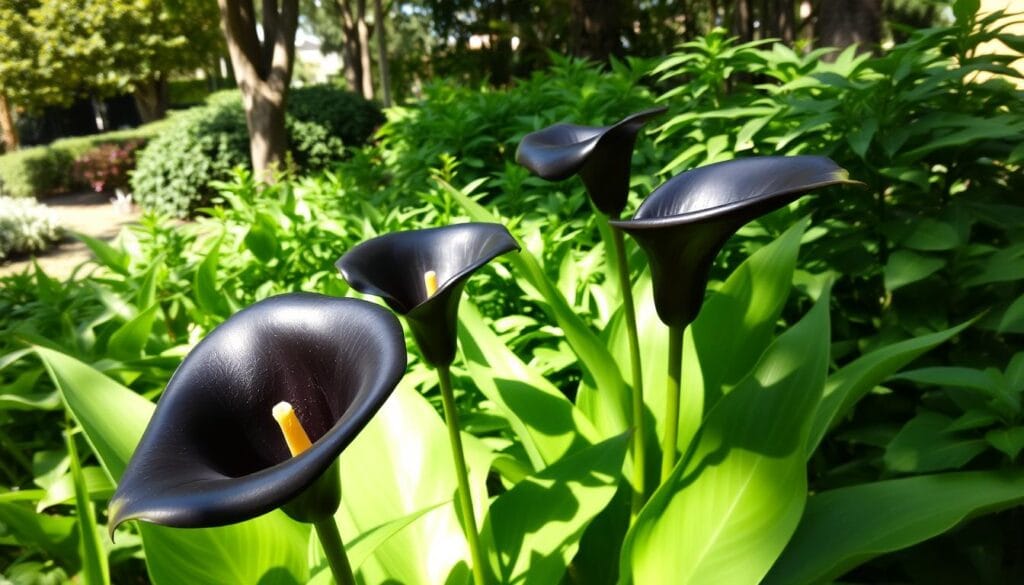
Combining Black Flowers with Other Colors
Pairing dark blooms with contrasting hues can make your garden or arrangements pop. Understanding color theory helps you create stunning displays. This showcases the beauty of somber bouquets and dark blooms.
Complementary Color Schemes
Highlighting black flowers with their complementary colors is captivating. For example, black dahlias look amazing with bright yellow or orange. Black roses pair well with soft lavender or lilac.
Design Principles for Dark Gardens
- Balance: Mix light and dark elements for harmony. Pair black irises with lighter perennials.
- Texture: Mix smooth and rough textures. Black calla lilies look great with spiky grasses.
- Lighting: Place black flowers in indirect or dappled light. It highlights their depth and richness.
| Color Combination | Suggested Black Flower Varieties | Design Impact |
|---|---|---|
| Black and White | Black tulips, black peonies | Timeless, elegant, and dramatic |
| Black and Purple | Black dahlias, black irises | Moody, sophisticated, and mysterious |
| Black and Red | Black poppies, black gladioli | Intense, bold, and captivating |
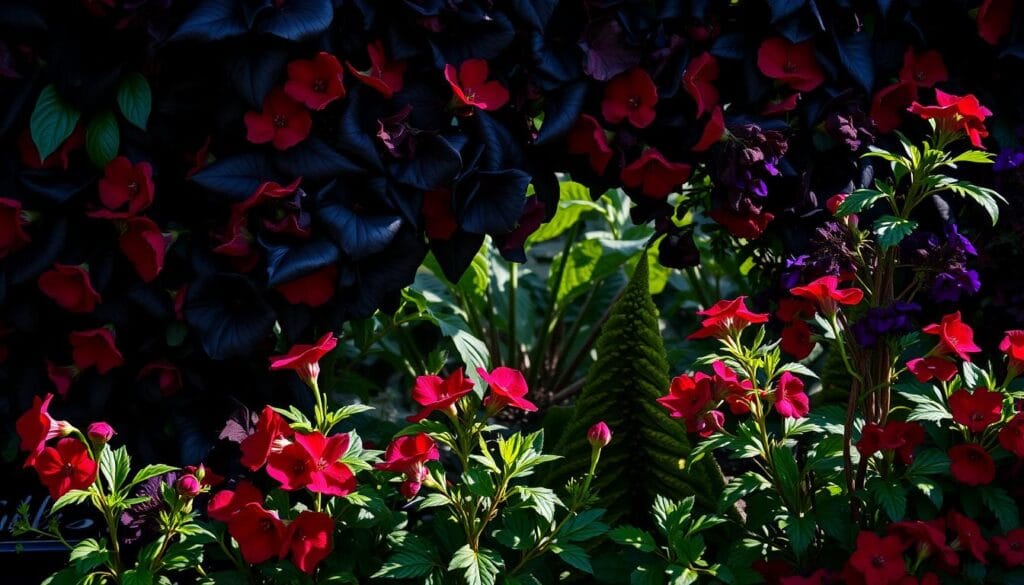
Using dark blooms can make your garden or arrangements stand out. Try different colors and designs to find your style.
Propagation Methods for Dark Varieties
To grow stunning black flowers and ebony petals, you need some skill. But the beauty they bring is worth it. Learning how to multiply these plants is essential. Let’s look at the ways to do it successfully.
Division: Splitting the Roots
For plants like irises and dahlias, division works well. Dig up the plant, split the roots, and replant in good soil. Make sure they get the right conditions to keep their deep colors.
Cuttings: Snipping for Success
Many ebony petal plants, like black petunias and tomatoes, grow from cuttings. Cut a stem, remove leaves, and plant it in moist soil. Soon, you’ll have a new plant to enjoy.
| Propagation Method | Best Suited for | Success Rate |
|---|---|---|
| Division | Perennials (e.g., irises, dahlias) | High |
| Cuttings | Annuals and some perennials (e.g., petunias, tomatoes) | Moderate to High |
| Seed Propagation | Many annual and perennial varieties | Variable |
Success in growing black flowers and ebony petals depends on knowing their needs. With patience and the right methods, you can grow more of these beautiful plants.
Using Black Flowers in Floral Arrangements
Black flowers may seem somber, but they can make stunning arrangements for many occasions. They’re perfect for a dramatic wedding bouquet or mourning arrangements to honor someone. These dark blooms add elegance and sophistication.
Creating Dramatic Bouquets
To make black flowers stand out, balance them with lighter colors. Try pairing them with soft pastels like white or blush, or earthy tones like green. This contrast is eye-catching and sets the mood for your arrangement.
For an even more dramatic look, mix different textures and shapes. Use black calla lilies or irises with velvety dahlias or delicate roses. This creates a bouquet that’s full of elegance and sophistication.
Preservation Techniques
Black flowers are delicate, so preserving them is key. This ensures your somber bouquets and mourning arrangements stay beautiful.
- Cut stems at an angle and immediately place them in clean, cool water.
- Use a floral preservative to extend the lifespan of your blooms.
- Store arrangements in a cool, dry place, away from direct sunlight.
- Consider using dried or preserved black flowers for longer-lasting displays.
Mastering black flowers in your designs can create captivating arrangements. They add mystery and elegance, perfect for formal events or personal tributes. These dark blooms make a strong statement.
Common Myths About Black Flowers
While black flowers are captivating, many myths surround them. Let’s clear up some common misconceptions about these dark blooms.
First, the notion that black flowers are rare or hard to grow is false. You can find many types, like black dahlias and black irises, that are easy to care for and grow.
- It’s not true that black flowers are linked to negativity or death. They often symbolize power, mystery, and elegance in different cultures.
- Some dark blooms might not last as long as brighter flowers. But, with the right care, you can make them last longer.
- Many think black flowers are hard to use in garden designs. But, they can add amazing contrast and depth to any garden, from modern to Gothic.
By understanding and debunking these myths, we can fully appreciate the beauty and versatility of black flowers in our gardens.
| Myth | Fact |
|---|---|
| Black flowers are rare and difficult to grow. | Many varieties are readily available and relatively easy to cultivate. |
| Black flowers are associated with negativity or death. | They can symbolize power, mystery, and elegance in various cultures. |
| Black flowers have a short vase life. | Proper handling and preservation techniques can extend their lifespan. |
| Black flowers are difficult to incorporate into garden designs. | They can create stunning contrasts and add depth to a wide range of landscape styles. |
Conclusion
Black flowers bring a captivating beauty to gardens and floral arrangements. They have a mysterious allure that draws many. From their symbolic meanings to their modern appeal, these flowers are truly special.
Black dahlias, roses, and calla lilies add elegance to any space. They fit well in many garden and floral styles. Knowing how to care for them ensures they thrive in your garden or arrangements.
Exploring black flowers opens up a world of creativity. You can create stunning, Gothic-inspired gardens or beautiful floral arrangements. With the right knowledge and imagination, the possibilities are endless.


